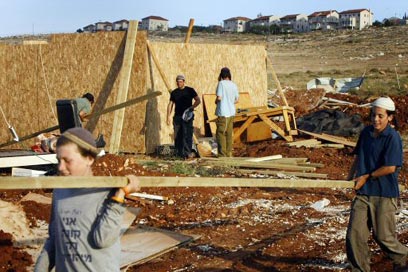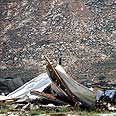Israel's
nationwide home front drill
will reach its climax on Tuesday with a siren sounding across the country, but until then settler leaders are not sitting idly by and are preparing for the worst scenario – a barrage of missiles with unconventional warheads striking the country.
Shomron Regional Council head Gershon Mesika sent a letter to the defense establishment on Monday morning, offering to accommodate citizens at settlements in the event of a missile attack on Israel.
The Shomron Regional Council has been working on this plan for about three months, focusing on the offer to take in more than half a million people evacuated from all over the country in case of a war and a state of emergency.
The settlers plan to accommodate the evacuees in public buildings in the settlements, in family homes and in a "tent city" which will be built in outposts. According to the plan's initiators, the likelihood that the Samaria area will be attacked is low due to its proximity to the Palestinian population, among other things.

Council head Mesika believes that the Samaria area must not be evacuated, as it is vital for the State's security.
"In addition to our natural right over the Land of Israel, the Samaria area is vital for the State from a security aspect, particularly in the face of the firing of unconventional missiles," he said.
"Samaria's residents are used to accommodate residents of bombed cities. This is what we have done in past wars and this is what we will do in a bigger state of emergency, which the State of Israel is practicing. Samaria is the right answer for the unconventional weapon threat and for the threats from Iran."
Tents against missiles
The plan, which was prepared by the regional council's security department and strategic unit is said to be based on experience accumulated in the Samaria communities in the past few years, which have become accustomed to taking in residents who left their bombed homes at times of war.
The initial plan is based on scattering the population in Samaria – where the crowdedness is low compared to the crowdedness in the lowland cities – and on the Samaria's height average over central Israel. In addition, the settlers note the area's proximity to northern Israel and to the Tel Aviv metropolitan area.
According to the plan, some 530,000 evacuees will be able to settle in the communities' public buildings, in the education institutions and in the hesder yeshivot, whose students will be enlisted. In addition, families will be accommodated at the residents' homes.
The plan states that non-religious families from Haifa and Carmiel will be taken in by the Shaked community in northern Samaria, families from Tel Aviv will be accommodated in Barkan, and ultra-Orthodox families from Bnei Brak will be accommodated in the Immanuel Regional Council.
Despite the threat of a nonconventional attack, the Shomron Regional Council also plans to set up a "tent city" within illegal outposts.
According to the plan, the tent city will be set up within four to seven days, and will include family tents, a dining room tent, a synagogue tent, etc.
The Samaria Regional Council stressed that the outpost residents were always willing to volunteer for national missions. The detailed plan also addresses the possibility that extreme left-wing organizations and anarchists will attempt to cause provocations around the communities, and calls for coordination and cooperation with the police in order to keep the extreme leftists away from the shelter areas.

Outpost destroyed by security forces
Photo: AP
מומלצים















